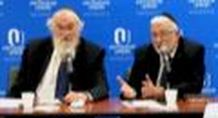אלו ואלו דברי אלקים חיים
All the Disputants Represent the Words of The Living Gd
All the Disputants Represent the Words of The Living Gd
|
We begin our interaction with Gd and Life, with the premise that everything is permitted, other than that which is specifically prohibited.
Our Sages take a very dim view of those who look for unnecessary stringencies and seek to reduce the enjoyment of those things that Gd created for us to enjoy. |
EiLu VeEiLu based upon an essay of HaRav Hershel Schachter The Talmud, as well as later Rabbinical literature, is replete with Halachic disputes and a decision must be taken to decide which opinion should be followed. Even when the Gemara rejects an opinion, we do not assert that it is incorrect. The Gemara (Eruvin 13b) states regarding the many disputes between Beis Shamai and Beis Hillel that, "eilu v'eilu divrei Elokim Chaim -- both opinions are the words of the Living Gd." notwithstanding that the Gemara itself asserts that generally speaking, we do not follow the views of Beis Shamai. Their thoughts, words and arguments, like those of anyone who has invested time and sincere effort learning the views of Beis Shamai, fulfils the Mitzvah of Talmud Torah. Arriving at a different conclusion, a conclusion that is not accepted as Halacha, does not indicate Gd’s displeasure. It does not render the Beracha made for Torah learning a wasted Beracha. Even if one invested the entire day, week or month learning and developing a particular approach and then recognised it was wrong, has fulfilled Gd’s command to learn Torah to the max. Learning the opinions in the Gemara, Rishonim and Acharonim that are not followed in Halacha constitutes a perfect fulfillment of the Mitzvah of Talmud Torah. Rav Soloveitchik would describe it as, this too is a Cheftza Shel Torah. The Ritva (ibid) explains: Moshe Rabbeinu, when first receiving the Torah, asked the Ribbono Shel Olam about the Halacha and what it is and how it is to be decided. HaShem explained, the mission is not to figure out what He has selected, but to figure out, using the mind, information and principles He has provided you, what it is that you should be doing. Torah scholars and the entire nation, of every generation are charged with the sacred duty to determine the Halacha - according to their perspective. The Gemara many times alludes to and even says explicitly, LaMah Li KeRa Sevara Hu [Gd does not provide a verse to teach a Halacha when that issue or notion is self evident.] Gd’s plan includes that it is difficult to find two people who see matters in exactly the same perspective and with the same balance. And so, Gd discloses to Moshe Rabbenu, each generation will have its Sages and Beis Din and they will need to arrive at a conclusion based upon discussions and a decision taken by a majority vote. Halacha is not a single absolute truth. Halacha is devotion to HKBH and that devotion is measured by our determination to seek truth not by blind obedience. Perhaps other religions are about obedience but that is not Yiddishkeit. The greatest honour we can bestow upon ourselves and upon HKBH is to learn and analyse His Torah and let it take us wherever our understanding leads us. This is not to say that every opinion must always be legitimate. Rashi and Tosafos (Kesubos 57a) clearly state that opinions might be incorrect. There are discussions amongst later Rabbinic authorities where it is clear that a passage in the Talmud has been overlooked. Beis Shamai and Beis Hillel argued many Halachic matters. Certainly they are both legitimate, honest and authentic analysis of Torah and are all the words of HKBH; nevertheless, the Gemara (Berachos 36b) states that, "Beis Shamai BeMakom Beis Hillel Eina Mishna", i.e. not just that the Halacha follows Beis Hillel rather, the opinions of Beis Shamai unlike other minority non-Halachic views, are given no weight. For example, in Hilchos Aveilus and Orla BeChutz LaAretz, even when dealing with a DeOraysa issue and even if the doubt is generated by a slight Safeik, the Halacha takes the lenient approach. A minority opinion, a non-Halachic opinion, is deemed to constitute a slight Safeik unless it is the opinion of Beis Shamai. Beis Shamai’s opinion in such matters, counts for nought. (See HaRav Schachter’s Sefer, BeIkvei Hatzon, Siman 38) A Shitah YeChidaAh, a lone opinion amongst other Poskim, also counts for nought. The Beis Shmuel (Shulchan Aruch, Even HaEzer Siman 90:6) suggests that the RaMBaM’s agreement with the Ri Migash (his father's Rebbe) constitutes but a single opinion and counts for nought, since the RaMBaM was so mesmerised by his stature and genius, he would unhesitatingly accept his opinion (however, we do find several instances in which the RaMBaM does reject the opinion of the Ri Migash). The Halachic rulings of the Beis Din HaGadol are binding on all Jews. These sages were accomplished Torah scholars, the Torah giants of their generation who have the status of Rabo Muvhak for their entire generation (Tosafos Berachos 31b and Shulchan Aruch, Yoreh Deah 244:10.) The Talmud Yerushalmi seems to hold that PikuAch Nefesh, which allows/instructs us to violate Torah laws, applies also when life will be made extremely miserable. Rav Yosef Engle in Teshuvas Aguna, says that accordingly, we would permit Agunos to engage in adultery if not for the Kiddush HaShem aspect that commands that one even give up their life rather than desecrate the sanctity of this command. |



